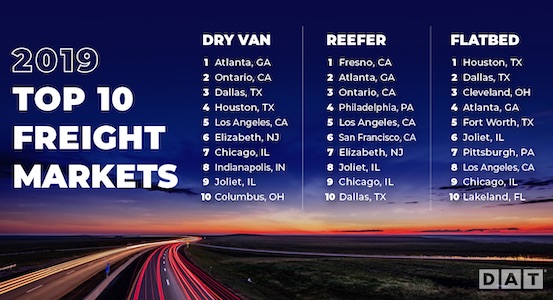
Back to the 3PL Future
January 22, 2020
Top Freight Markets
February 5, 2020Transportation Safety is Job One

The key to safe driving
The Commercial Vehicle Safety Alliance (CVSA) will coordinate its annual International Roadcheck May 5 – 7, 2020. Coordinated with the Federal Motor Carrier Safety Administration, this initiative lands a 72-hour roadside inspection of commercial motor vehicles throughout North America, including the United States, Canada, and Mexico.
If nothing else, the International Roadcheck is effective in issuing violations and, for those in large violation, taking vehicles out of service. By the numbers, the FMCSA reports that last year’s Roadcheck resulted in:
-
3,355,425 inspections
-
944,794 total driver violations
-
195,545 total out-of-service driver conditions
The most common violations last year? According to Transport Topics, “Some of the common driver requirement violations include failure to show proof of medical qualifications, insurance and vehicle registration, detected drug or alcohol use, failure to wear a seat belt and presenting an inspector a false record-of-duty status.”
CVSA’s approach is thorough and involves a 37-step checklist in two categories ⏤ reviewing driver operating requirements and vehicle mechanical fitness. As CVSA describes it:
“The vehicle inspection includes checking critical vehicle inspection items such as: brake systems, cargo securement, coupling devices, driveline/driveshaft components, driver’s seat (missing), exhaust systems, frames, fuel systems, lighting devices, steering mechanisms, suspensions, tires, van and open-top trailer bodies, wheels, rims and hubs, and windshield wipers. Additional items for buses, motorcoaches, passenger vans or other passenger-carrying vehicles include emergency exits, electrical cables and systems in engine and battery compartments, and temporary and aisle seating.”
What may be an inconvenience to carriers (yes, some choose to take vacation days during the 72-hour roadcheck) is, in our view, an important step toward better road safety.
That safety is essential to us. First and most importantly, we want everyone ⏤ regardless of association with NATCO ⏤ to experience safe driving conditions. (As our driver’s ed teacher said years ago, “The best ride is an uneventful ride.”) Beyond that, everyone wins when a movement of freight is safely delivered. That includes, carrier, customer, dispatch, and 3PL.
Preventive maintenance is the story here. It’s far less expensive than reactive maintenance or paying a fine, or laboring to get back into service.
It starts with buckling your seat belt. And it never ends.

